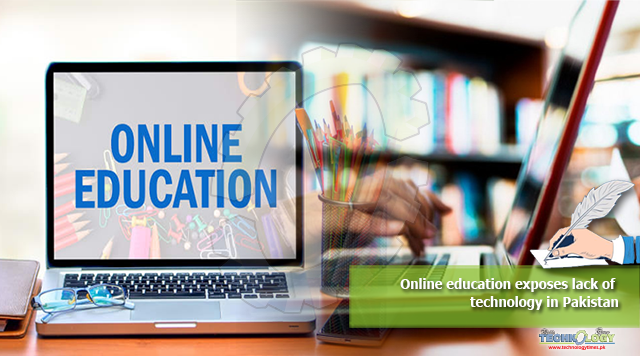The much-debated online education in Pakistan has challenged the students, teachers and also exposed the lack of technology in Pakistan that is hindering the quality of online education.

Online education exposes lack of technology in Pakistan : The much-debated online education in Pakistan has challenged the students, teachers and also exposed the lack of technology in Pakistan that is hindering the quality of online education. With the exponential increase of the novel coronavirus, the world has had to come up with novel strategies to address the issue.
Lockdowns across the globe to contain the virus resulted in a shift from doing things traditionally. Due to the urgent lockdown, the country’s educational institutions transitioned to a world of online learning. This was a timely decision taken by the government which not only safeguarded the lives of pupils but also protected a large number of individuals related to the education sector across the board.
The goal was clear – to make sure that learning is not disrupted for students. While the goal may seem fruitful, a myriad of struggles have been associated with online education in Pakistan.
Online education stands to be a champion of minimising academic disruption. It is imperative to understand that online education brings forth the issue of the “haves and have nots” (Tikly). Globalisation has allowed technology to permeate however, it is still considered a luxury in many parts of Pakistan. A small percentage of the population has access to good quality internet connection or an internet connection at all.
Online education exacerbated the inequalities in our society. Many students are not able to access their once accessible classrooms due to the lack of a stable internet connection. The recent trend on twitter by students under the name, “#WeRejectOnlineEducation” highlights the trajectory of this debate. Students from various cities came forth with the inequalities online education brought upon them.
Many students from private and public institutions demanded the decision of schools going online be retracted, as they did not have the means or the infrastructure in their locality to set up a stable internet connection.
The transition to online education was a rather hasty one, which did not allow adequate training for teachers or students to comprehend the complexity of this new way of education. This quick shift to the new mode of education has highlighted the insufficient ATL skills (approaches towards learning) of teachers due to which students are unable to comprehend. The lack of training to equip oneself to perform immaculately to this new approach to education has resulted in stunting learning.
Many teachers do not have enough knowledge to counter pranks played by students on this virtual set up, neither do they have enough training to allow their classes to process smoothly if there is any connectivity error. Online education has brought forth the issue of the accessibility of cheating that teachers have a hard time tackling.
Another struggle of online education not just in Pakistan but around the globe is the loss of personal interaction. Schools are seen as the bridge from the private to public sphere. Other than the curriculum being taught, students learn from their real-life interactions and experiences that help them groom as a person altogether.
Muneebur Rehman in his recent article suggests, “our non-disciplined lifestyle, and lack of focus during e-learning further the students from taking online classes.” The loss of an experience from going to one’s academic institution has made students feel demotivated on various fronts. Students find it difficult to routinise their lifestyles in order to accommodate online learning.
Pakistan has been struggling on various fronts in the education sector and this pandemic has added salt to the wound. The multiple education systems which further increase the class divide have not been quite fruitful in catering to the needs of the population as a whole. Previously, it was a struggle between Urdu-medium and English-medium only but now, virtual schooling has added a new unexpected twist to it. Adapting to these unforeseen circumstances will not be easy but by providing appropriate training and equipment to the teachers, the country can cope with some of the current education crisis.
Originally Published at THE NATION